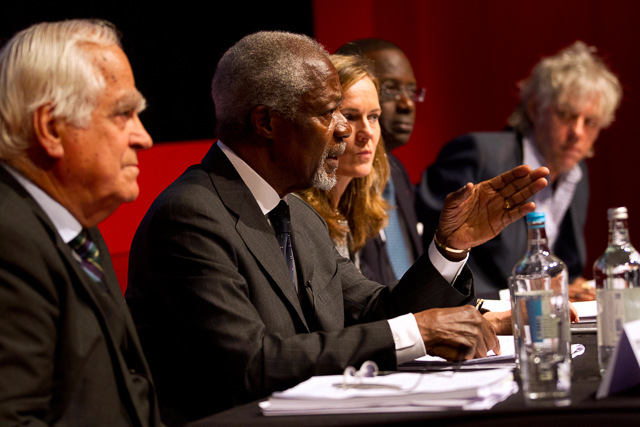The Africa Progress Panel pulled no punches when it turned the spotlight on Africa’s forest and ocean resources in the 2014 edition of its Africa Progress Report. Titled Grain, Fish, Money: Financing Africa’s Green And Blue Revolutions, the report applauds the continent’s economic growth, but cautions against exaggerated optimism, citing increases in inequality and poverty amid misplaced policies, natural resource plunder, financial mismanagement, and under-investment in basic infrastructure and human capital.
“If Africa’s leaders act now to reduce poverty and inequality, invest in their agriculture and fisheries, and protect their people from criminal business, they can leave a legacy of justice, prosperity, and peace,” said Kofi Annan, former U.N. secretary general and chairman of the Africa Progress Panel, when he and fellow panel members made the report public on May 8 in London.
The other panel members echoed his severe tone. “What is going on is criminal activity. Be under no illusion about this,” insisted Bob Geldof, musician, businessman and advocate.
Peter Eigen, founder of Transparency International, decried “the relationship between the powerful and very often corrupt and unaccountable elites in Africa and powerful companies coming from the global north,” saying it “permeates all of the issues we are discussing.”
The 2014 progress report calls on African leaders and policymakers to unleash a green revolution to transform agriculture, buttressed by innovative, homegrown policies and practices.
One-fourth of Africans are malnourished, yet the continent loses US$4 billion in food every year to post-harvest inefficiencies, including poor storage, and $17 billion a year, roughly equal to the GDP of the Democratic Republic of Congo, to illicit logging. Between 2000 and 2010, Africa’s average grain yield stood at one-third to one-half of the world’s average, yet, tests in six African countries suggest that some maize yields could increase five-fold. With a population of 1 billion, Africa exports less food than Thailand (population 67 million), but agricultural productivity could easily double within five years.
In the same vein, the report urges a “blue” revolution to halt the plunder of Africa’s coastal waters. The continent has some of the world’s highest rates of illegal, unreported, and unregulated fishing, costing West Africa alone an estimated $1.3 billion every year, not to mention damage to livelihoods in coastal communities, ecological systems, and food and nutrition security. Beyond local policies and vigilant monitoring, what’s needed is a multilateral fisheries regime that imposes sanctions on fishing vessels that do not report their catches, the report says.
“Commercial trawlers that operate under flags of convenience and unload in ports that do not record their catches are engaging in organized theft disguised as commerce,” Annan warned.
Efforts on both domestic and international fronts will be needed to finance green and blue revolutions in Africa. Reducing the cost of money is critical. Prohibitive loan rates and a lack of access to savings institutions often leave farmers without access to funds that would allow them to take advantage of market opportunities. In many African countries, interest rates on loans are 20 percent and higher.
“There’s no way a farmer can borrow at that rate and survive,” Annan said.
Reducing the cost of money also applies to remittances from Africans residing abroad, estimated at $60 billion a year and exceeding net official development assistance from all sources and, in most cases, exceeding foreign direct investment. The cost of remitting $1,000 to Africa is $124, compared to a global average of $78, and to South Asia $65. These excessive, suspiciously similar charges by money transfer operators in developed countries costs Africa $1.85 billion a year and warrants investigation by financial regulators in those countries, the report argues.
Tidjane Thiam, CEO of the London-based international financial services group Prudential Plc and a panel member, stressed the importance of insurance in mobilizing capital. Because African farmers lack access to insurance, they put their savings into contingency funds, rather than investing them in boosting productivity.
“We’re missing a step in Africa by not having a proper insurance industry. In the financial system insurance plays an absolutely crucial role in mobilizing resources,” Thiam said.
Other ways of mobilizing capital include making venture capital and equity more available—guaranteeing and underwriting equity investors who invest in small enterprises; making the continent’s stock markets accessible to small and international players; and establishing well regulated commodity exchanges where farmers can sell their products at global market rates, rather than to monopoly buyers who squeeze the prices.
The good news is, some countries have begun their agricultural revolution with innovation and smart policies, the panel reports. Nigeria’s ministry agriculture purchases seeds and fertilizers and distributes these directly to the farmers, thereby eliminating the middlemen and assuring the farmers decent prices. In Ethiopia, agricultural growth has helped to halve poverty rates to 30 percent in 2011 from 60 percent in 2005.
With some 60 percent of the world’s uncultivated arable land and a youthful workforce, Africa has the potential to feed itself. Not only could African farmers capture the continent’s food import market, valued at $35 billion a year, but they also could produce enough to meet global food demand, which the UN estimates will double by 2050.
When all is said and done, the commitment to and level of investment in human capital development will determine the success and sustainability of economic transformation in Africa.
“Our continent has no shortage of human talent. If Africa’s citizens can freely use all theirs talent and creativity, then Africa can truly be prosperous, stable, and fair,” Annan said.













